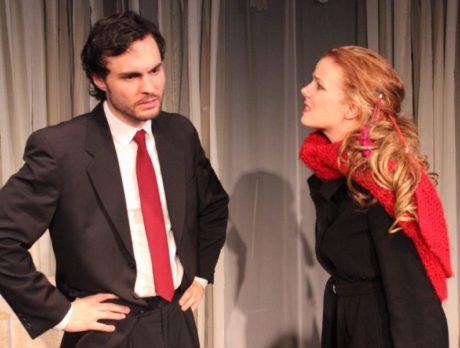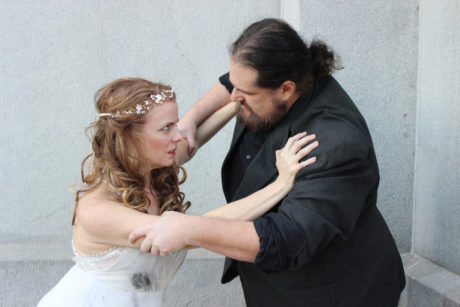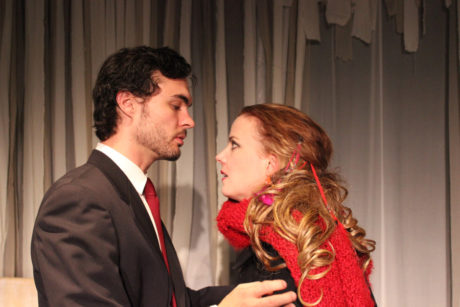By the Bog of Cats – a modern Irish drama by Marina Carr, who has taught in Ireland and the U.S., including at Villanova University – echoes classical Greek theater, especially Medea by Euripides. The playwright centered part of her work on the mistreatment of children. Even though she was only seven years old during the Bloody Friday and Sunday uprisings in Ireland, some of that violence comes through strongly in her work.
At the same time, her use of dark humor, even during some of the grimmest, toughest themes seem to go back to ancient tragic myths. However, Carr’s tragic plays do not look at the historic events in her homeland but the domestic and inner violence that her characters experience. This play references not only a famous Greek tragedy, but also presents hilarious Irish scenes that balance the seriousness of the situation.

Henrik Eger: As a child, Marina Carr and her siblings built their own little theater and performed plays. “It was serious stuff,” she said, “the plays were very violent!” Describe an incident from your life that helped you in portraying your character’s emotions in this play.
Kirsten Quinn (Hester Swane): My father was a police officer for 37 years, and he shared a great deal with me throughout his career about the diabolical nature of human beings. He did not shy away from showing me crime scene photos. I wanted to understand the good and the evil of this world. I once even went to the Medical Examiner’s office with him and looked at many gruesome cases.
Hester is a murderess. But she is haunted by loss and abandonment, and that is always what provokes her murderous tendencies. When she kills Josie, she is doing so out of love, and a desire for Josie to never experience what she endured. I, too, have experienced feelings of abandonment, and while I would never go to her lengths, I understand the feelings and the pain.
Susan Giddings (Monica Murray): I can relate to the feeling of not “belonging,” which may have given me some insight into how Monica relates to the people within her community. She still grieves over the loss of her son – for which she blames herself – and is the only person who offers friendship to Hester.
Tina Brock (The Catwoman): A car accident in my youth left behind a residual heightened sense of impending doom, helpful for working on Catwoman. She’s a seer with her sixth sense as her guide, less an emotion than an intuition – nerve endings on overload, picking up the vibrations from the characters and the bog.
Arlen Hancock (Carthage Kilbride): I modify much of my real life for the stage. So when I’m doing anything out of my comfort zone, I take something from myself that may feel close to that and just apply the imaginary circumstance.
Mark Knight (Ghost Fancier): My character is the Deus Ex Machina of the play. As such, I don’t have emotions. I am death – or perhaps fate. The only interaction I have is with Hester Swane. I’ve never collected a ghost or soul so I don’t have much to call upon from my life experiences.
Referencing Medea by Euripides, Holly Hunter described this play as “Pure poetry. No one has this kind of powerful voice. You have to go back to the classics.” Share a line or two from this play that shows potent language at work and tell us why it spoke to you.
Kirsten: “You won’t forget me now, Carthage. When all of this is all over or half remembered, and you think you have forgotten me all over again, take a walk along the Bog of Cats, and wait for a purling wind in your hair, or a breath in your ear, or a rustle behind you. That will be Josie and me, ghostin’ ya.”
These lines make the hair on the back of my neck stand on end. It is a final moment of revenge on Carthage, but it also demands that he think about what has happened and remember Hester forever. This is what Hester wants: existence – even in death.
Arlen: “I’ll come down on ya like a bull from heaven.” I think this play has an otherworldly tone to it, a grand scale that is undoubtedly synchronized to Greco/Roman theater. This is just a single line, one amongst many, that are imbued with these tones. This particular poetry wouldn’t be nearly as provocative without the use of the Irish dialect. This play lives, as written, in an Irish incubator.
Tina: On medical intervention versus herbal remedies: “They cured her alright. They cured her so well she came back cured as a side of ham in an oak coffin with golden handles.”
Ethan Lipkin (Xavier Cassidy): “It’s that hour when it could be aither dawn or dusk, the light bein’ so similar” (Hester). This line establishes the world of this play somewhere out of time; subsequently, the rules of “civil” society do not necessarily apply in The Bog of Cats. Though simple, this line establishes the Bog as an underworld of sorts and allows for the possibility of the supernatural and provides a path for spiritual transition and the specter of death which is present in this scene.
Mark: “A devouring poison consumed her limbs, as with fire” That’s just good writing!

Could you quote one line from your role that goes to the essence of this play?
Kirsten: “I’ll drink the enemy’s wine. Not the wine’s fault it fell into the paws of cutthroats and gargoyles.” Hester does not turn down any offers, no matter how minor.
Tina: “That’s a fine answer. Half a lie and half a truth.” Catwoman intuits that Hester has committed an offense that’s caught up with her and asks her what it was. Hester responds: “I done nothin’ – or if I did, I never meant to.”
Arlen: Father Willow would likely be the top choice for comedic characters. My favorite, “It may or may not surprise you that I was once almost a groom meself. Her name was Elizabeth Kenney… no that was me mother’s name.” He’s indicative of the religious culture in Ireland and its absurdity. His contradictory nature, being a devoted man of God who can hardly be called devoted, speaks loudly to the hypocritical Christian ideals of the other characters in the play.
Susan: Monica doesn’t have many funny lines in this play, but she shows her humor when describing Father Willow’s antics to Xavier at the wedding reception: “The state of him with his hat on all during the Mass and the vestments inside out and his pyjamas peepin’ out from under his trousers.”
Mark: When Hester Swane asks “So what do you do, Mr. Ghost Fancier? Eye up ghosts? Have love affairs with them?” he replies, “Dependin’ on the ghost.” It’s both creepy and funny. I love that kind of writing.
Ethan: “… your mother taught you nothing, Swane, except maybe how to use a knife.” One of the major themes in this play is the mythologizing and longing for absent mother figures, which contributes to Hester’s instability and inevitably Josie’s death. Caroline as well is motherless and adrift. With this line, Xavier cuts through Hester’s delusion to provide a flicker of truth. Ironically, the only living mother represented in the play is written as overbearing, comical, and somewhat cruel.
Is there anything else you would like to share about this play?
Tina: The poetry is beautiful. Carr’s language gives the audience a sense of the very specific community of characters living in an other-worldy place.
Mark: It’s funny and scary and tragic. There are so many good parts for women in this play and all the women in it revel in it. Last night I watched Kirsten Quinn and Jenna Kuerzi playing Hester and Caroline respectively: they had me laughing and tearing up in their last scene together. Sue Giddings’ as Hester’s friend – and drinking companion – is such fun to watch, gulping wine and gossiping. Tina Brock as the Catwoman is a roaring-mad and hilarious blind old biddy. Mary Pat Walsh is the funniest and meanest Granny you ever saw, and her onstage granddaughter, played by Keri Doheny, is the cutest 7 year-old ever to have her throat cut.
The male actors in the play are okay, too [he laughs].
Kirsten: To me, this is the role of a lifetime. I have always wanted to play Medea, but to be able to play her as an Irish Traveler adds a whole other complexity and dimension because of my great love of Irish plays. This character is physically powerful – like a tiger – monstrous, loving, decimated, creative, brilliant, tactical, murderous, motherly, sentimental, stubborn, suspicious, treacherous, unyielding, vengeful, crafty . . . the list goes on. She is a dichotomy and offers an actress a great range of emotion with which to play.
Above all, she is a deeply flawed human being. Every performance, I find something different, some other layer to portray. And I am grateful for the rest of the ensemble, for they are just as complex and fascinating as Hester is – more so in many ways. I am astounded by the level of talent we have in this show, both in the acting and in the direction, technicians, and of course our tireless stage managers and crew.
Arlen: I enjoy immersing myself in the role. And this cast is absolutely wonderful. We are very lucky to be a part of this show.
Susan: It is a great Irish play and a pleasure to be part of this production with the Irish Heritage Theater (IHT).

Running Time: Two hours and 15 minutes, including one intermission.
By the Bog of Cats plays through Saturday, November 18, 2016, at the Irish Heritage Theatre, performing at Walnut Street Theatre Studio 5 – 825 Walnut Street in Philadelphia, PA. For tickets, call (215) 735-0630, or purchase them online.




